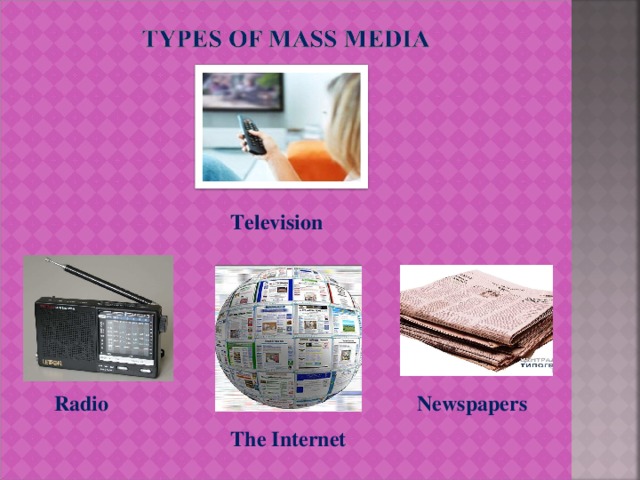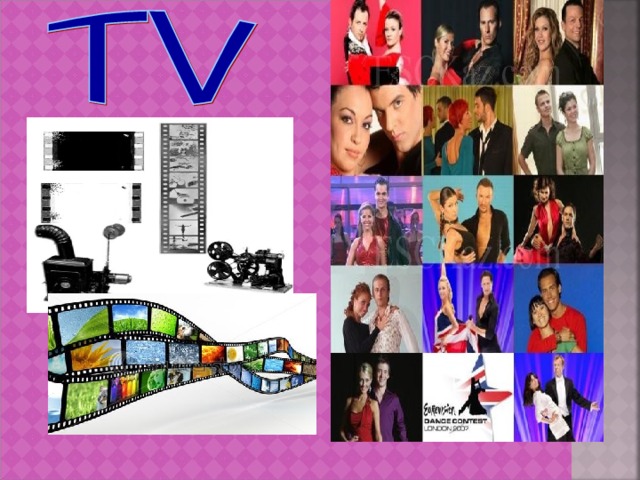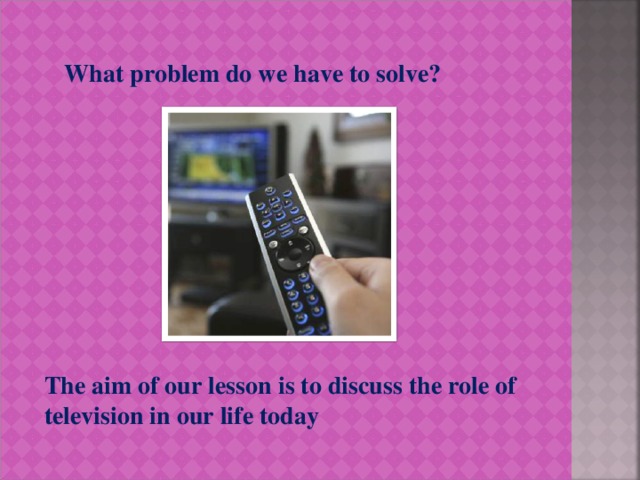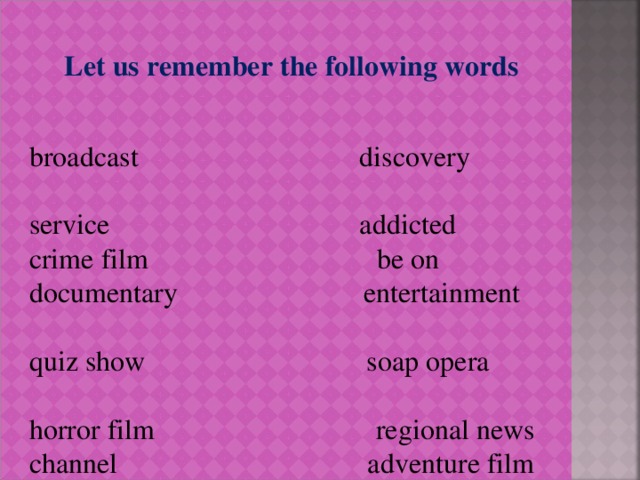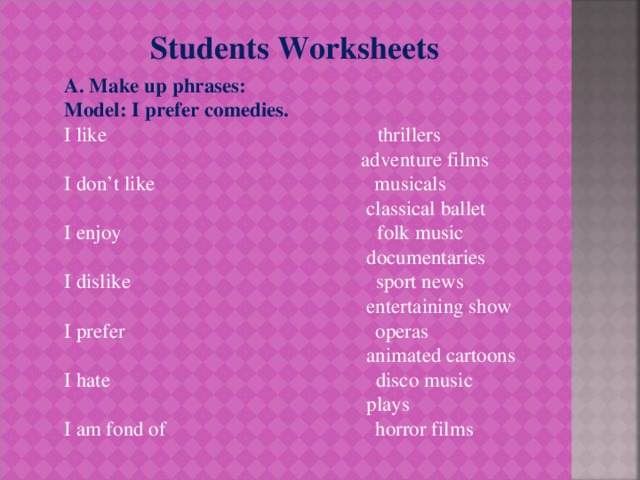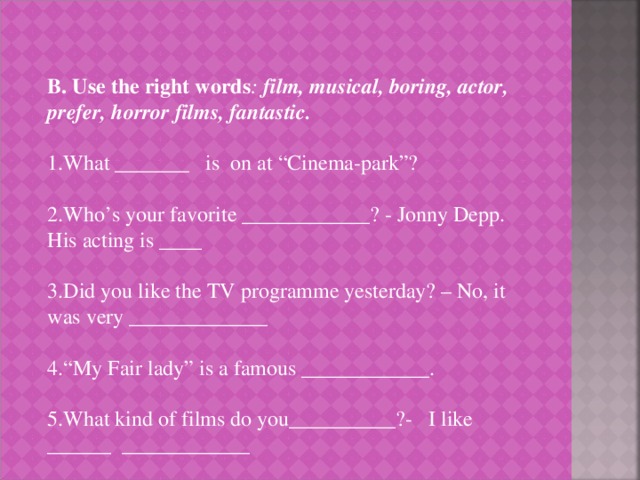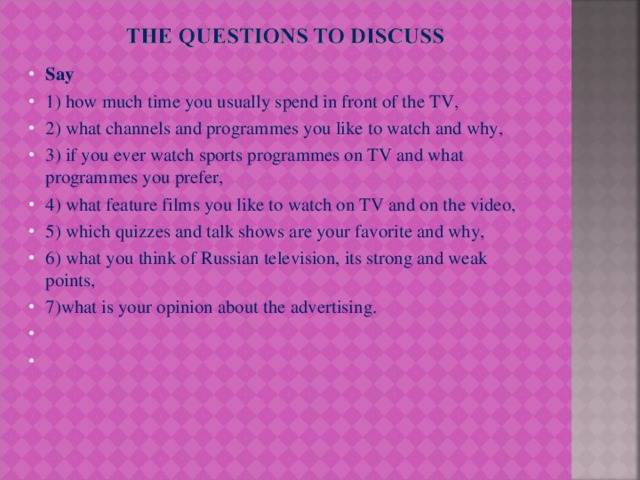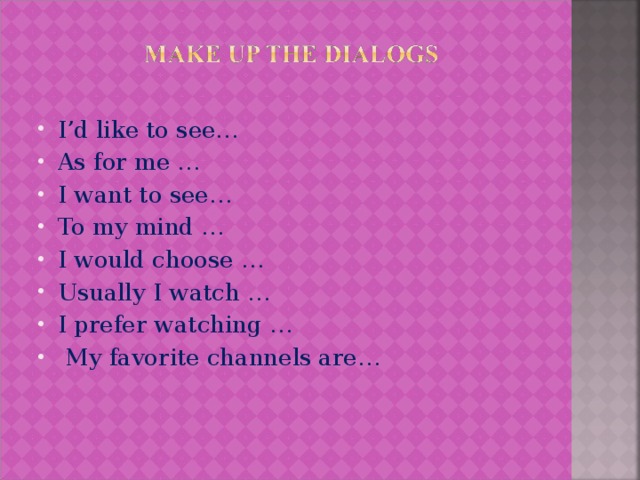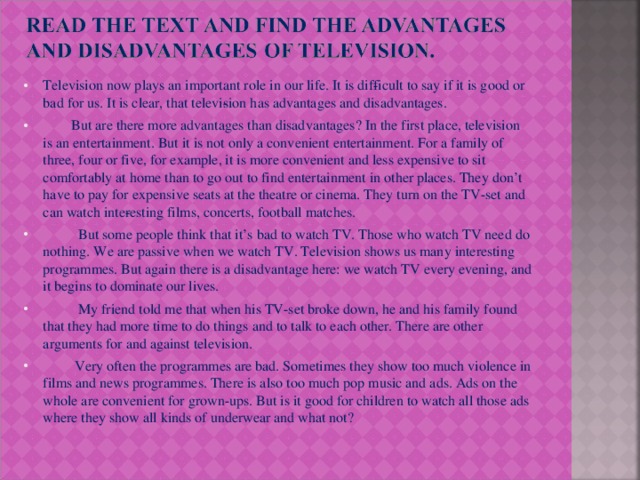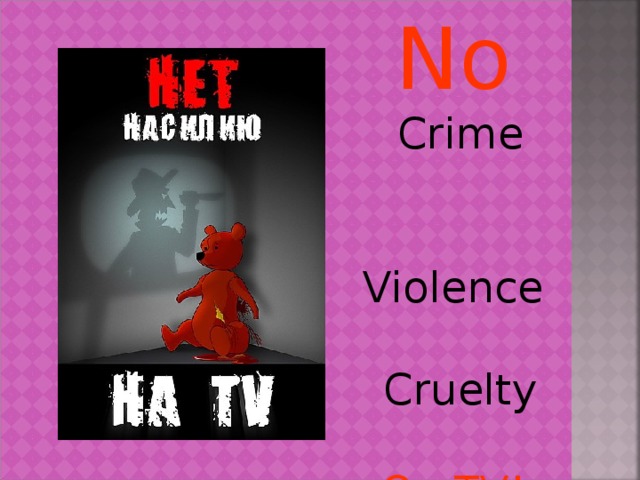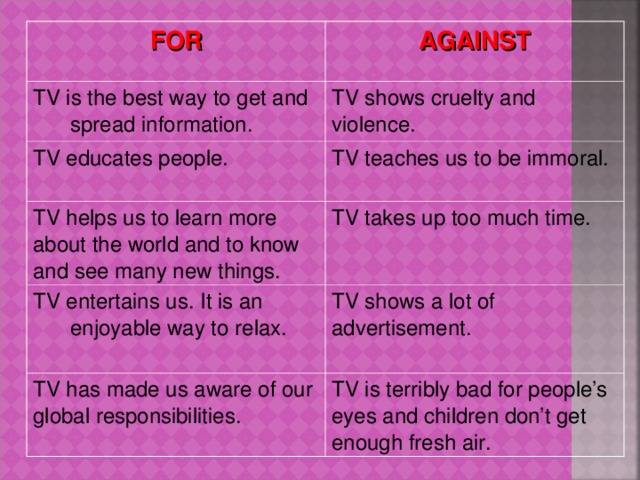расширение общего кругозора; углубление знаний учащихся о средствах массовой информации, в частности о телевидении, в России
совершенствовать навыки коммуникативной компетенции учащихся.
самостоятельно строить речевое высказывание; воспитывать терпимое отношение к мнению других людей, умение работать в группах и в диалоге;
развивать умения учащихся выделять главное, логично и последовательно излагать мысли на иностранном языке.
повышать мотивацию к изучению английского языка.
Урок предназначен для обучающихся 9 класса. Тема урока: «Средства массовой информации. Телевидение».
Этап обучения по данной теме – завершающий. Мотивация изучения данной темы обеспечивается за счет постановки проблемы, применения ИКТ, использования заданий разных видов. Приоритетная цель на уроке: развитие коммуникативной компетенции учащихся на базе изученной лексики
Методическая разработка представляет собой разработку конкретного урока по английскому языку с использованием средств ИКТ. Актуальность разработки заключается в том, что учащиеся самостоятельно ищут ответ на вопрос какие преимущества и какие недостатки имеет телевидение. Различные виды речевой деятельности, аудирование, чтение текстов, работа в группах, наличие межпредметных связей способствуют развитию познавательного интереса к английскому языку. Урок комбинированный, в котором сочетаются проблемная, интегрированная и ИКТ-технология
Использование методов, основанных на создании проблемных ситуаций и активной познавательной деятельности учащихся, позволяет нацелить обучающихся на поиск и решение сложных вопросов, требующих актуализации знаний. Проблемную ситуацию на уроке создаю с помощью активизирующих действий, вопросов, подчеркивающих новизну, важность объекта познания. Создание в учебной деятельности проблемных ситуаций и организация активной самостоятельной деятельности обучающихся по их разрешению позволяют творчески овладевать знаниями, умениями, навыками, развивать мыслительные способности.
Таким образом, проблемное обучение позволяет направлять учащихся на приобретение знаний, умений и навыков, на усвоение способов самостоятельной деятельности, на развитие познавательных и творческих способностей.
На сегодняшний день икт – технологии занимают все большее место в образовательном процессе. Главным преимуществом этих технологий является наглядность и интерактивность. Информационные технологии помогают сделать процесс обучения творческим и ориентированным на учащегося. Для этого создаю к урокам презентации, интерактивные тесты, использую видеосюжеты.
| Этап урока | Деятельность учителя | Речь учителя | Деятельность учащихся | Речь учащихся | Оборудование
|
|
I.Организационный момент
|
Приветствует учеников, создает атмосферу иноязычного общения, используя мультимедийную презентацию. Спрашивает о предполагаемой теме урока, указывая на слайд. |
- Good morning, students. I am glad to see you. How are you getting on?
-What do you think we are going to speak about?
-Yes, you are quite right. Today we’re going to speak about TV and TV programmes , we’ll talk about your favorite channels and programmes, films, about your TV habits. I hope you’ll take an active part in the lesson. |
Приветствуют учителя, отвечают на вопросы, включаются в речевую деятельность. Смотрят на изображение на слайде, формулируют тему урока.
|
- Good morning! - Fine, thank you. - I’m all right. - I’m OK, thank you.
- I suppose we’ll speak about the mass media and especially about television.
|
Слайд 1: «Mass media.Television»
|
| II.Актуализация знаний. Речевая зарядка | Задает вопросы по ранее изученному материалу.
| - What mass media do you know? What mass media do you enjoy most of all? - Do you like watching television? How long and when you watch TV? -Why do you watch TV? Why do people watch TV? -Favourite programmes of UK teenagers are sitcoms, dramas.What are your favourite TV- channels and programmes? What TV- reporters do you | Учащиеся отвечают на поставленные вопросы.
like?
| -I know some mass media such as newspapers and magazines, television, radio and naturally the Internet. -As for me I enjoy surfing the Net. -Yes, I like watch ing television. - I watch TV to learn news, watch nice pictures, get some information. - My favorite TV-channel is “Discovery”. I like documentaries and talk shows. I haven’t got a favorite TV-reporter.
| Слайд 2: «Types of mass media»
|
| III.Целеполагание | Побуждает учащихся к постановке проблемы, которую необходимо решить на уроке. Предлагает посмотреть видеоролик “The dangers of television” и ответить на поставленный вопрос.
| People spend their free time in different ways. In the 20 th century the television was the main mass media in the people’s life. There was no advertisement on it. There were few channels. Now it has changed. Is it good or bad? Try to guess: What problem do we have to solve? -Yes, you are right. The aim of our lesson is to discuss the role of television in our life today. Today we are going to speak about television itself and TV broadcasts. Every day, especially in the evening, people turn on their TV - sets to watch their favorite programmes and broadcasts. They spend their free time watching the news of a day or the TV – films. | Просматривают видеоролик и отвечают на поставленный вопрос, выражая свои мнения по поводу цели урока.
| -I suggest we are going to discuss the problem if modern television is good or bad. -In my opinion we’ll speak about advantages and disadvantages of our TV nowadays. -I think we are going to find good points of the television and its bad points.
| Слайд 3: «The modern television»
Видеоролик “The Dangers of the TV Addiction”
Слайд 4: Целеполагание |
| IV. Формирование и развитие лексических умений по теме
| Предлагает посмотреть на слайд и вспомнить изученную лексику по теме «СМИ»
Выдает раздаточный материал учащимся, объясняет письменное задание. | Let us remember the words we have learned before.
Look at your papers. There you can see exercise А. Make up phrases: Model: I prefer comedies.
B. Use the right words: film, musical, boring, actor, prefer, horror films, fantastic. | Учащиеся смотрят на слайд, читают слова и переводят их на русский язык.
Работают самостоятельно, составляя предложения по образцу, записывая их на листе.
Работают самостоятельно, вписывая ответы в рабочий лист | Broadcast, service, crime film, documentary, quiz show, cartoon, horror film, channel, discovery, addicted, be on
I like thrillers. I don’t like adventure films. I enjoy musicals. I dislike classical ballet. I hate folk music I am fond of horror films like King-Kong.
1.What film is on at “Cinema-park”? 2.Who’s your favorite actor? - Jonny Depp. His acting is fantastic. 3.Did you like the TV programme yesterday? – No, it was very boring. 4.“My Fair lady” is a famous musical. 5.What kind of films do you prefer?- I like horror films. | Слайд 5: Слова для повторения
Слайды 6 -7: Раздаточный материал (рабочие листы учащихся) |
| V.Развитие навыков аудирования | Предлагает учащимся прослушать текст и ответить на вопросы | Furkat has got a special task from me to prepare a small report on this topic. So, let us listen to her very attentively, paying attention to the answers on my questions. 1. When and where was TV born? 2. Who was its fonder? 3. What are the largest TV companies in Russia? 4. Does TV play an important role in transformation of information?
| Слушают сообщение и отвечают на вопросы | 1. The system of television was first established in 1907.in St. Petersburg. 2. Its founder was professor Rosing. 3. The largest companies in Russia are “Ostankino” and “Russian TV”. 4. Yes, TV plays an important role in transformation of information?
| Текст сообщения для аудирования: The system of television was first established in 1907. It was proposed by Petersburg’s professor Rosing. Now there are many independent television companies in Russia. “Ostankino” and “Russian TV” are the largest of them. The Television plays an important role in transformation of information to the population. It gives us the abroad information. The population can see not only news but many other interesting things. There are also many educational programmes. Even small towns have television companies. Television is one of the most important means of communication. |
| V. Развитие навыков устной речи. Групповая работа.
| Организует работу в группах на тему: роль телевидения в жизни людей. Озвучивает вопросы, которые обучающиеся должны затронуть в своих высказываниях
| Nowadays television plays an important role in most people’s lives. How true is it for you? In small groups speak on the following items. Choose one person in the group to sum up the results.
| Работают в группах, обсуждая данные учителем вопросы, учащийся от каждой группы высказывает общее мнение.
| - People watch TV more than 2 hours a day. The favorite channels and programmes are news, music programmes and serials. Pupils think that Russian television is very good. But TV has its strong points and weak points, such as advertisement. It has a lot of bad points. It doesn’t talk about product’s defects, puts pressure on consumers, make people to buy things they don’t need. Sometimes it is very silly and annoying. -We think that television doesn’t play an important role nowadays, because many people are fond of the Internet. They like to surf the Net, to communicate with other people, there one can find different information. In our opinion advertising has good points. It gives true information about things, helps to improve your taste. It is creative, clever and funny. | Слайд 8: Вопросы для обсуждения в группах. Say 1) how much time you usually spend in front of the TV, 2) what channels and programmes you like to watch and why, 3) if you ever watch sports programmes on TV and what programmes you prefer, 4) what feature films you like to watch on TV and on the video, 5) which quizzes and talk shows are your favorite and why, 6) what you think of Russian television, its strong and weak points, 7)what is your opinion about the advertising.
|
| VI.Развитие навыков диалогической речи | Организует работу в парах, объясняет задание, озвучивает вопросы, дает опоры для составления диалогов | Work in pairs. Now make up your dialogues about your favorite channels. What programme do you prefer? What is your favorite channel? How long do you watch TV? Do you watch TV alone? What genres of films do you prefer? How do you like teenagers’ programme?
| Работают в парах, составляют диалоги о телевизионных каналах и программах | Примерный диалог: S1: Sergey, do you like watching television? S2: I am not very fond of it, but sometimes I spend my free time in front of it. What about you? S1: To my mind it is very boring, I prefer surfing the Net. And What programmes do you prefer? S2: I am interested in sport, so usually I watch sport programmes, football and hockey matches. S1: What is your favorite channel? S2: It is Rossia 24. I also like Discovery; it sometimes shows very interesting information.
| Слайд 9: I’d like to see… As for me … I want to see… To my mind … I would choose … Usually I watch … I prefer watching My favorite channels are… |
| VI.Развитие навыков чтения с пониманием основного содержания прочитанного.
| Объясняет задание. Организует парную работу учащихся. Организует контроль монологической речи: представитель от каждой пары представляет составленный рассказ.
Подводит итог высказываниям обучающихся и спрашивает их мнение, решена ли поставленная проблема.
Делает вывод, что несмотря на роль интернета в настоящее время. люди не могут жить без телевидения. | Work in pairs. Read the text and find the advantages and disadvantages of television.
-Well, students. To summit up, answer my question: What problem have we discussed at our lesson? Express your opinion about it.
-Yes, I fully agree with you. Look at the screen once again and be sure that TV has its good points and bad points. But I think the In spite of the Internet the cannot live without television. Do you agree with me? | Читают текст. Один из учащихся находит преимущества, другой недостатки ТВ, затем высказывают свое мнение.
Учащиеся высказывают свое мнение
Учащиеся прочитывают предложения на экране и соглашаются или не соглашаются с выводом учителя | - Television informs, educates, and entertains people. And we have to say it doesn’t try to raise cultural level of the people or develop their artistic taste. Many of TV programmes are excellent: they are made in good taste and with great professional skill. It also brings cultural and educational programmes. - There is also a lot of advertising on TV. A lot of commercial firms buy the time to advertise their goods. Advertising often annoys the general public. A film, a good basketball or football match may be interrupted several times with advertisements for soap powder or perfume. To convince the viewers that a certain product is the best and to persuade them to buy it takes not only a lot of imagination but also a lot of time. The same advertisements are repeated many times every day, which bores the viewers. Some people say there is too much violence on television, which had a bad influence on viewers, especially young people. Television often shows scenes of violence. - We have discuss ed the role of television in our life today. -In my opinion, it is difficult to say, if it is good or bad. The TV has its prons and cons. -I think it is the most widespread mass media for elder people, but the teens prefer the Internet.
-Yes, I do. I agree with you. -No, I do not. I don’ agree with you.
| Слайд 10: Текст для чтения.
Слайд 11: No violence on TV
Слайд 12: Television: For and Against
|
| VII. Заключительный этар. Рефлексия. | Просит учащихся высказать свое мнение об этапах урока, указать на возникшие трудности, подводит итоги урока, дает оценку работы учеников на уроке, стимулирует дальнейшую работу.
| -Dear students! Our lesson is almost over. Thank you. You were active and bright. I'd like to thank you for your work. You were really great! Now I want you to draw up your feelings and impression. What do you think of our lesson? - What did you do during the lesson? - Which part of the lesson did you like best? - What was difficult for you? Thank you for your attention and for your work.
| Выражают собственное мнение, анализируют собственные достижения и затруднения, записывают домашнее задание, задают вопросы. Учащиеся с помощью символических значков рисуют «впечатления» об уроке. Отвечают на вопросы учителя. |
-Thank you for the lesson. I liked it very much. Listening was especially difficult for me. -As for me, everything was difficult besides exercises on worksheets. |
Слайд 13: Thank you for your attention. |

